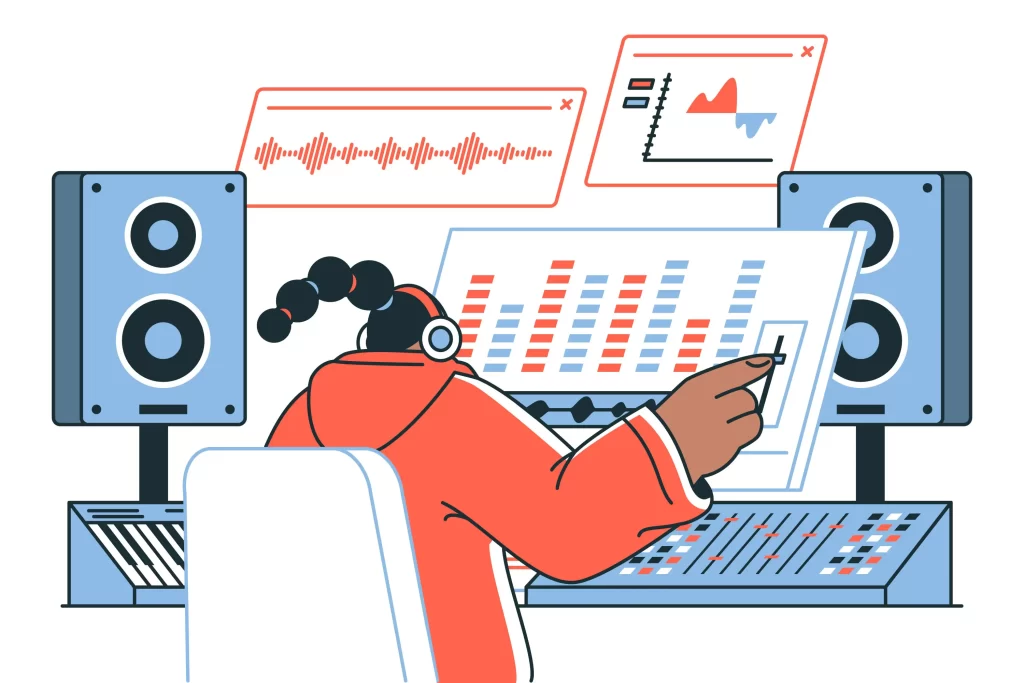- blog20
Guardians of Sound: How IP Law Safeguards the Music Industry

Today’s fast-paced digital environment has brought about a significant upheaval in the music industry. The importance of IP for musicians’ rights has increased significantly in light of the growth of social media, internet streaming services, and international distribution networks. Protecting artists’ rights largely depends on intellectual property (IP) legislation, ensuring their labors and inventiveness are properly acknowledged and compensated. We’ll explore how intellectual property (IP) law safeguards the music business and how tools like Dibs make preserving creative works easier.
What is Intellectual Property in Music?
Intellectual property (IP) in music envelopes the security infrastructure to legally safeguard creative works, such as songs, lyrics, melodies, and sound recordings. Intellectual property (IP) in the music business gives authors the authority to use and distribute their original compositions. These rights guard against unauthorized duplication, distribution, or public performance while guaranteeing that authors can profit from their creations.
Intellectual property (IP) comes in many forms in the music industry, such as patents, trademarks, and copyrights. While they all have various purposes, they all help to safeguard music’s intellectual property (IP) law rights. Copyrights, conversely, ensure the ownership of the music itself, including compositions and sound recordings, whereas trademarks shield a band’s moniker or emblem.
How Does IP Law Protect Musicians and the Music Industry?
IP law, particularly copyright law, is the backbone of protecting music and ensuring that musicians retain control over their creative outputs. Here’s how it works:
- Exclusive Rights: Under copyright law, musicians have the right to copy, distribute, and perform music. These rights guarantee that the only people who can choose how to utilize their music are the creators or licensees.
- Protection Against Infringement: Artists are shielded from unapproved uses of their work by intellectual property legislation. The creator may file a lawsuit to protect their rights if music is performed, sold, or copied without the author’s consent.
- Royalties: Copyright guarantees that musicians receive payment for public performances, broadcasts, and sales of their music. To ensure that musicians receive compensation for any usage of their music, groups such as ASCAP and BMI collect royalties on their behalf.
- Licensing Agreements: Under IP legislation, musicians are permitted to provide licenses to third parties. For instance, a songwriter may authorize a motion picture producer to use a particular song in the picture. IP law gives this agreement legal enforceability.
- Moral Rights: Under the intellectual property law in music of certain nations, authors can prevent their works from being altered or distorted. This guarantees that their music’s integrity is upheld.
How to Protect Music Copyrights?
Protecting music copyrights ensures that creators maintain control over their work. Here’s how to safeguard these rights:
- Register Your Work: Copyright protection usually kicks in after the work is generated. However, there are also legal advantages to registering your music with the appropriate copyright office, such as having a public record of ownership and claiming statutory damages in the event of infringement.
- Take a look at licensing platforms: By licensing your music through groups like BMI or ASCAP, you can ensure that you get paid when people perform or broadcast it. These platforms support the management of rights and guarantee payment.
- Use Digital Rights Management (DRM) and Watermarking: Digital watermarking allows you to monitor the usage of your music. DRM systems can also stop illegal music distribution and copying.
- Use Dibs: Dibs is a creative and easy method for musicians to protect their rights while easily claiming ownership of creative works. A Dibs certificate provides instantaneous evidence of creation and ownership.
Importance of Protecting Intellectual Property Rights in Music
For artists and musicians to be able to profit from their creations and keep them safe from infringement, intellectual property rights for music are essential. The IP protection in the music industry as a whole would be vulnerable to exploitation in the absence of adequate protection. IP is crucial for artists for the following reasons:
- Monetization: Thanks to IP regulations, musicians can profit from their creations through sales, royalties, and licensing. Without these rules, it would be difficult for musicians to support themselves through their work.
- Creativity & Innovation: Intellectual property rules promote creativity by guaranteeing that artists’ ideas and creations won’t be plagiarized or misappropriated.
- Market Recognition: Trademarks safeguard band names, logos, and brand identities, allowing musicians to establish their reputations without worrying about name theft.
- Legal Recourse: Under intellectual property law, musicians are entitled to sue infringers if their rights are breached. This discourages people who may otherwise attempt to pilfer or exploit the efforts of others.
How Dibs Helps Protect Intellectual Property Rights in Music
Although copyrights and trademarks are often regarded as the finest ways to safeguard intellectual property, they have drawbacks, particularly for freelance artists or musicians who lack the financial means to deal with the legal system. Here’s where Dibs enters the picture.
A quicker and easier way to claim ownership of creative work is through Dibs. Instead of going through a time-consuming application process or dealing with legal formalities, musicians may now use Dibs to stake their claim on a song or melody. With Dibs, you can:
- Claim Ownership Immediately: Dibs allows you to protect your rights from the moment you create something, providing instant evidence of creation.
- Simplify the Process: Dibs eliminates the need for pricey attorneys or complicated paperwork. This simple and intuitive platform makes it ideal for hassle-free intellectual property protection.
- Musicians can concentrate on their profession without worrying about the complex legal aspects of intellectual property protection. Dibs allows authors to rest easy knowing that their intellectual property is protected.
Dibs is the best option for independent musicians, songwriters, and creators looking for a dependable, easy-to-use method of safeguarding their intellectual property (IP). It’s a crucial component of a musician’s intellectual property defense plan.
Summing up
Intellectual property legislation is essential for the protection of IP in the music industry and musicians’ rights. IP law ensures that artists keep control and are fairly compensated for their work. Examples include copyrights that protect original music and trademarks that protect a musician’s brand. Dibs and other solutions streamline the process even more, allowing musicians to safeguard their intellectual property without being mired in red tape. The first step for every artist or creative who wants to protect their work is to claim Dibs.
